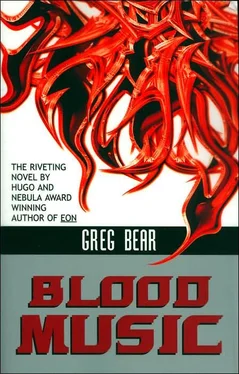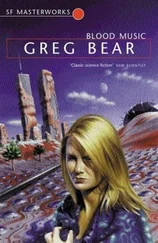Gregory Bear - Blood Music
Здесь есть возможность читать онлайн «Gregory Bear - Blood Music» весь текст электронной книги совершенно бесплатно (целиком полную версию без сокращений). В некоторых случаях можно слушать аудио, скачать через торрент в формате fb2 и присутствует краткое содержание. Город: New York, Год выпуска: 2005, ISBN: 2005, Издательство: ibooks, Incorporated, Жанр: Фантастика и фэнтези, на английском языке. Описание произведения, (предисловие) а так же отзывы посетителей доступны на портале библиотеки ЛибКат.
- Название:Blood Music
- Автор:
- Издательство:ibooks, Incorporated
- Жанр:
- Год:2005
- Город:New York
- ISBN:1596871067
- Рейтинг книги:4 / 5. Голосов: 1
-
Избранное:Добавить в избранное
- Отзывы:
-
Ваша оценка:
- 80
- 1
- 2
- 3
- 4
- 5
Blood Music: краткое содержание, описание и аннотация
Предлагаем к чтению аннотацию, описание, краткое содержание или предисловие (зависит от того, что написал сам автор книги «Blood Music»). Если вы не нашли необходимую информацию о книге — напишите в комментариях, мы постараемся отыскать её.
Blood Music — читать онлайн бесплатно полную книгу (весь текст) целиком
Ниже представлен текст книги, разбитый по страницам. Система сохранения места последней прочитанной страницы, позволяет с удобством читать онлайн бесплатно книгу «Blood Music», без необходимости каждый раз заново искать на чём Вы остановились. Поставьте закладку, и сможете в любой момент перейти на страницу, на которой закончили чтение.
Интервал:
Закладка:
Bernard. You still work on our *blood music*.
Hadn’t Ulam used that phrase once?
Is it that you WISH to join us on our level? We did not consider this possibility.
–I’m not sure what you’re suggesting.
The part of you which stands behind all issued communication may be encoded, activated, returned. It will be like a DREAM, if we understand fully what that is. (ANNOTATION: You dream all the time. Did you know that?)
–I can become one of you?
We think that is a correct assessment. You already are one of us. We have encoded parts of you into many teams for processing. We can encode your PERSONALITY and complete the loop. You will be one of us—temporarily, should you choose. We can do it now.
–I’m afraid. I’m afraid you’ll steal my soul from inside…
Your SOUL is already encoded, Bernard. We will not initiate unless we receive permission from all your mental fragments.
“Michael?” Paulsen-Fuchs’ voice pulled him out of the conversation. Bernard shook his head and blinked at the viewing chamber window. “Michael? Are you awake?”
“I’ve been… awake. What is it?”
“A few days ago you gave us permission to have Sean Gogarty visit you. He is here now.”
“Yes, yes.” Michael stood. “In there with you? My eyes are blurry.”
“No. Outside. I suspect you will wish to get dressed, clean up first.”
“Why?” Bernard countered testily. “I’m not going to be a pretty sight no matter how often I shave.”
“You wish to meet him as you are?”
“Yeah. Bring him in. You interrupted something interesting, Paul.”
“We are all becoming just interruptions to you now, aren’t we?”
Bernard tried to smile. His face felt stiff, unfamiliar. “Bring him in, Paul.”
Sean Gogarty, professor of theoretical physics at Kings College, University of London, stepped up into the viewing chamber and shielded his eyes with one hand as he peered into the containment lab. His face was open, friendly, nose long and sharp, teeth prominent. He was tall and carried himself well, and his arms looked well-muscled under his Irish wool jacket. His smile faded and his eyes narrowed behind stylish aviator glasses as he saw Bernard. “Dr. Bernard,” he said, his voice pleasantly Irish with a touch of Oxford.
“Dr. Gogarty.”
“Professor, that is, just Sean, please. I like to eschew titles.”
“Then I am Michael.” Am I?
“Yes, well in your case… er… it’ll be a bit harder to stick to that. I know of you, and I’m sure you’ve never heard of me, er, Michael.” Again the smile, but without certainty, troubled. As if, Bernard thought, he expected a human being and met—
“Paul has briefed me on some of your work. You’re a bit beyond me, Sean.”
“Indeed. This thing, this incident in your country is as much beyond me, I’m certain. I have a few things I would like to talk out with you, Michael, and not just you.”
Paulsen-Fuchs looked at Gogarty with some apprehension. No doubt this meeting was sanctioned by several governments, Bernard thought, or it never would have happened, but Paul was still on edge.
“My colleagues, then,” Bernard gestured at Paulsen-Fuchs.
“Not your human colleagues, no,” Gogarty said.
“My noocytes.”
“Noocytes? Yes, yes, I understand. Your noocytes. Tielhard de Chardin would have approved of that name, I think.”
“I haven’t been thinking much about Tielhard de Chardin lately,” Bernard said, “but he might not be a bad guide.”
“Yes, well, I’m here just barely, by the scruff of the neck,” Gogarty said, “and my time has been limited. I have a notion to propose to you, and I would like you and your small colleagues to pass judgment on it.”
“How did you get detailed information about me, about the noocytes?” Bernard asked.
“Experts all over Europe are being approached. Someone came to me on a hunch. I hope it doesn’t affect his promotion. I’m not highly respected by all my fellows, Dr. Bernard—Michael. My ideas are more than a touch far-out.”
“Let’s hear them” Bernard said, growing impatient.
“Yes. I assume you haven’t heard much about Information Mechanics?”
“Not a whisper,” Bernard said.
“I’m working in a very specialized area of that branch of physics—an area not yet recognized—the effects of information processing on space-time. I’ll put it simply enough, because the noocytes may already know more than I and be better able to explain it to you—”
“Don’t count on it. They relish complexity, and I don’t.”
Gogarty paused and sat absolutely still for several seconds. Paulsen-Fuchs glanced at him with fleeting anxiety.
“Michael, I have amassed a great deal of theoretical structure which supports the following assertion.” Deep breath. “Information processing—more strictly, observation—has an effect on events occurring within space-time. Conscious beings play an integral role in the universe; we fix its boundaries, to a great extent determine its nature, just as it determines our nature. I have reason to believe—just an hypothesis so far—that we don’t so much discover physical laws as collaborate on them. Our theories are tested against past observations both by ourselves—and by the universe. If the universe agrees that past events are not contradicted by a theory, the theory becomes a template. The universe goes along with it. The better the theory fits the facts, the longer it lasts—if it lasts at all. We then break the universe down into territories—our particular territory, as human beings, being thus far quite distinct. No extraterrestrial contact, you know. If there are other intelligent beings beyond the Earth, they would occupy yet other territories of theory. We wouldn’t expect major differences between the theories of different territories—the universe does, after all, play a major role—but minor differences might be expected.”
“The theories can’t be effective forever. The universe is always changing; we can imagine regions of reality evolving until new theories are necessary. Thus far, the human race hasn’t generated nearly the density or amount of information processing—computing, thinking, what have you—to manifest any truly obvious effects on space-time. We haven’t created theories so complete that they pin down reality’s evolution. But that has all changed, and quite recently.”
Listen closely to the GOGARTY.
Bernard perked up and began to pay more attention.
“If I only had time to present my mathematics, my correlations with formal information mechanics and quantum electrodynamics… and if only you could understand!”
“I’m listening. We’re listening, Sean.”
Gogarty’s eyes widened. “The’… noocytes? Have they responded?”
“You haven’t given them much to respond to. Do go on, Professor.”
“Until now, the densest single unit of information processing on this planet was the human brain… slight nod to cetaceans, perhaps, but not nearly as much stimulus and processing going on, much more insular I’d say. Four, five billion of us, thinking every day. Small effects. Time stresses, little tremors as it were, not even measurable. Our powers of observation—our power to formulate effective theories—is not sufficiently intense to bring about the effects I’ve discovered in my work. Nothing in the solar system, perhaps not even the galaxy!”
“You are rambling, Professor Gogarty,” Paulsen-Fuchs said. Gogarty gave him an irritated nod and fastened his eyes on Bernard’s, pleading with him.
He speaks of interest.
“He’s getting to the point, Paul, don’t rush him.”
“Thank you. Thank you very much, Michael. What I am saying is that we now have conditions sufficient to cause the effects I’ve described in my papers. Not just four, five billion individual cogitators, Michael, but trillions… perhaps billions of trillions. Most in North America. Tiny, very dense, focusing their attention on all aspects of their surroundings, from the very very small to the very large. Observing everything in their environment, and theorizing about the things they do not observe. Observers and theorizers can fix the shape of events, of reality, in quite significant ways. There is nothing, Michael, but information. All particles, all energy, even space and time itself, are ultimately nothing but information. The very nature, the timbre of the universe can be altered, Michael, right now. By the noocytes.”
Читать дальшеИнтервал:
Закладка:
Похожие книги на «Blood Music»
Представляем Вашему вниманию похожие книги на «Blood Music» списком для выбора. Мы отобрали схожую по названию и смыслу литературу в надежде предоставить читателям больше вариантов отыскать новые, интересные, ещё непрочитанные произведения.
Обсуждение, отзывы о книге «Blood Music» и просто собственные мнения читателей. Оставьте ваши комментарии, напишите, что Вы думаете о произведении, его смысле или главных героях. Укажите что конкретно понравилось, а что нет, и почему Вы так считаете.












